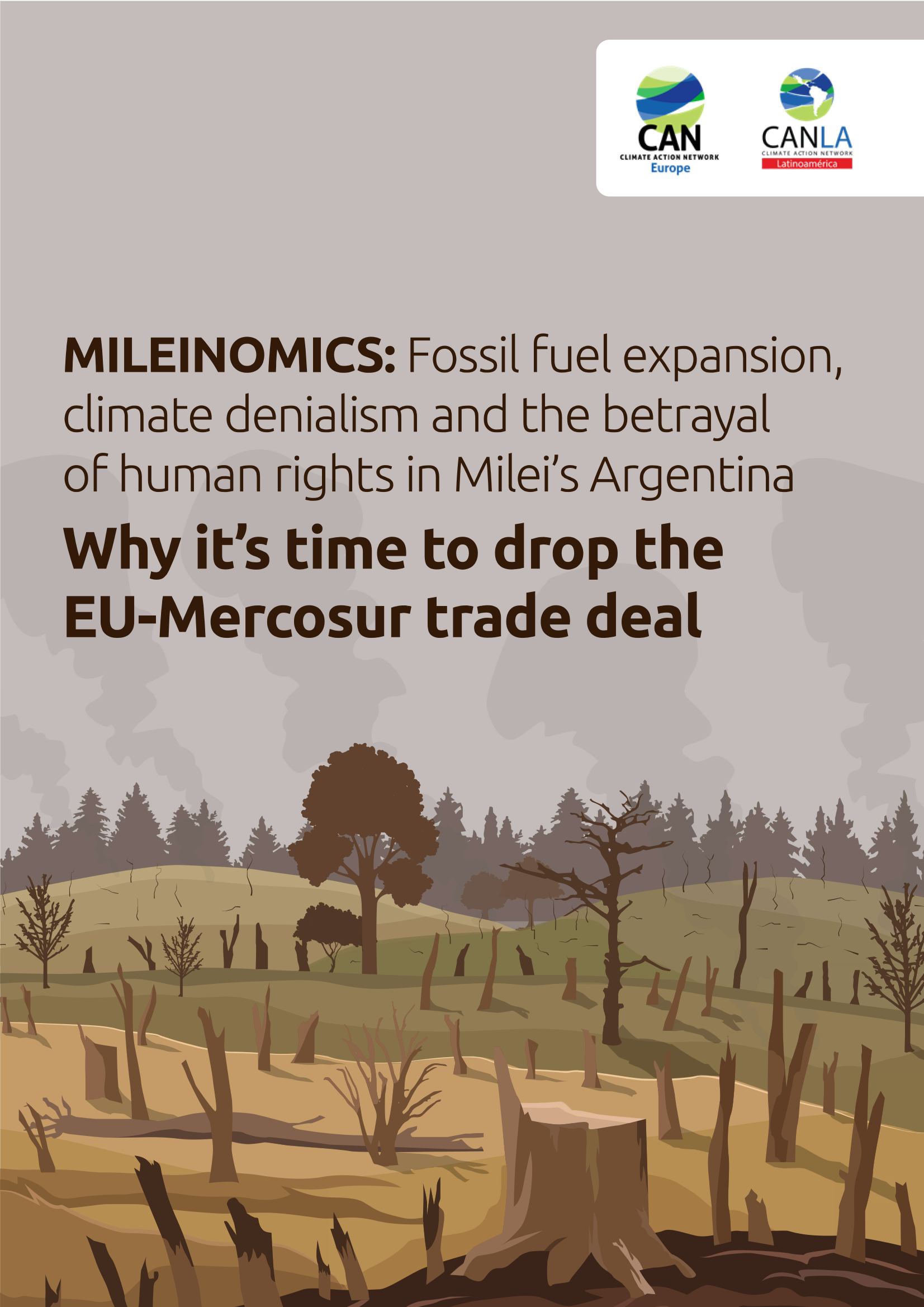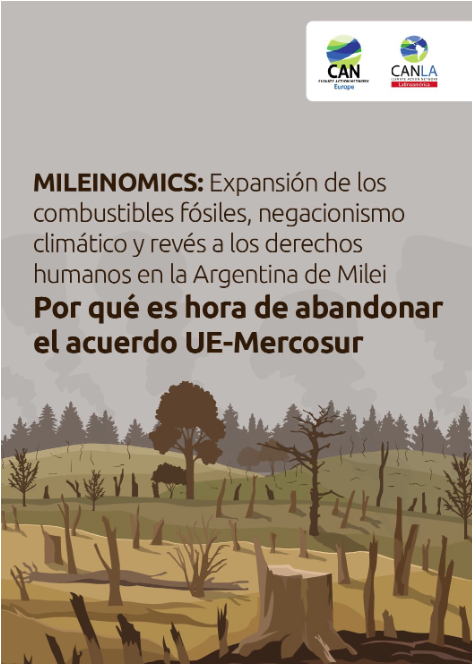En español abajo
Brussels/Baku/Buenos Aires, 13 November 2024 – As EU-Mercosur negotiations are speeding up, rumoured to be advancing around the G20 summit in Brazil next week and sealed by the end of 2024, a new report by Climate Action Network (CAN) Europe and Climate Action Network Latin America (CANLA) uncovers the climate-wrecking economic shock plans by Argentina’s far-right President Javier Milei, and how the EU-Mercosur trade deal risks fueling Argentina’s social-ecological crisis and climate-breakdown. If ratified, the EU-Mercosur deal will boost harmful industries by increasing trade in products such as beef, soy, pesticides banned in the EU, combustion cars and raw materials that are among the biggest drivers of deforestation, greenhouse gas emissions, biodiversity loss and displacement of Indigenous peoples in Argentina and other Mercosur countries.
Audrey Changoe, Trade and Investment Policy Coordinator at CAN Europe and co-author of the report, said:
“Milei’s climate denialism and ‘chainsaw policies’ combined with the outdated EU-Mercosur trade deal is a recipe for disaster. The EU-Mercosur deal is based on a text from 25 years ago and totally out of sync with the reality of the climate crises we face today. ‘Mileinomics’ coupled with the EU-Mercosur deal could cause critical ecological spillovers globally, as it will further threaten South America’s second-largest forest, the Chaco forest, also one of the planet’s largest carbon sinks.”
Fossil fuel expansion above democratic rights
Amid harsh repression of protesters, a sweeping economic reform bill was adopted in June, granting Milei unprecedented powers to roll back environmental and democratic rights with the aim of advancing the new Large-scale Investment regime (RIGI). The RIGI’s primary goal is to boost large-scale investments in oil, gas, mining, agribusiness and forestry sectors. While extractive industries profit from far-reaching economic benefits and investment protection under the investor-state dispute settlement (ISDS) mechanism, RIGI does not include any social or environmental requirements for these industries. The creation of a special “Security Unit”, tasked to mobilize military forces in extractive regions, underscores the Milei administration’s intent to suppress social resistance to these destructive projects.
Maristella Svampa, renowned Argentinean environmentalist and co-author of the report, said:
“Milei’s reforms severely undermine our democratic rights. It includes the notorious ISDS mechanism allowing corporations to sue the provincial governments in secretive corporate courts, instead of our domestic courts, if they believe public policies, including environmental protection measures, interfere with their profits. Argentina is already the world’s most sued country in investor-state disputes, including claims by major fossil fuel giants such as Total Energies, BP and Repsol.”
The EU-Mercosur deal empowers Milei’s destructive agenda
The EU, which claims to be a champion of the green transition, is willing to do business with the climate-sceptic far-right president in Argentina and is rushing to finalise the environmentally damaging EU-Mercosur trade deal. The EU-Mercosur deal is set to exacerbate Argentina’s crisis, where poverty rates have reached historic levels of 55%, boosting unchecked extractivist industries, with damaging consequences for people’s fundamental rights to a healthy environment and a safe climate.
Three-quarters of Europeans want the deal to be scrapped if it leads to deforestation and environmental damage. Yet despite widespread opposition, including from small-scale and medium-sized European farmers, the European Commission is now trying to create a shortcut to changing the voting process which would bypass the scrutiny of national EU governments critical of the deal, undermining democratic rights, and violating the negotiation mandate.
Laura Restrepo Alameda from Climate Action Network Latin America said:
“No greenwashed annexes can fix this inherently bad deal. It is built to promote trade in products driving deforestation, land grabbing, massive pesticide use, carbon emissions and human rights violations. The deal pushes South America further into ecological collapse and props up a destructive neo-colonial economic system that drives social inequalities. The deal will severely affect the collective rights of Indigenous communities who already bear a disproportionate burden of the climate crisis and outrageously were never consulted about the deal.”
ENDS
For more information and media requests:
Jani Savolainen, Communications Coordinator, jani.savolainen@caneurope.org
Karina Saravia, Coordinadora de Comunicación CANLA, ksaravia@canla.org
Interviews available in EN, FR, ES, NL, PT, DE
Notes to editors:
- A summary of the report and the full report are available here.
Hipocresía climática antes del G20: Un nuevo informe expone los peligros de las reformas económicas de Milei que destruyen el clima y por qué el acuerdo comercial UE-Mercosur debe ser finalmente abandonado
Bruselas/Bakú/Buenos Aires, 13 de noviembre de 2024 – Mientras se aceleran las negociaciones UE-Mercosur, que se rumora se cerrarán en torno a la cumbre del G20 en Brasil la próxima semana, un nuevo informe de Climate Action Network (CAN) Europe y Climate Action Network América Latina (CANLA) desvela los planes de choque económico del presidente de extrema derecha de Argentina, Javier Milei, que destruyen el clima, y cómo el acuerdo comercial UE-Mercosur corre el riesgo de alimentar la crisis socio-ecológica y el colapso climático y ambiental de Argentina.
Si se ratifica, el acuerdo UE-Mercosur impulsará industrias nocivas al aumentar el comercio de productos como la carne de vacuno, la soya, los pesticidas prohibidos en la UE, los coches de combustión y las materias primas, que se encuentran entre los principales motores de la deforestación, las emisiones de Gases de Efecto Invernadero, (GEI), la pérdida de biodiversidad y el desplazamiento de los pueblos indígenas en Argentina y otros países del Mercosur.
Audrey Changoe, Coordinadora de Política Comercial y de Inversiones de CAN Europa y coautora del informe, ha declarado:
«El negacionismo climático de Milei y sus ‘políticas de motosierra’ combinadas con el obsoleto acuerdo comercial UE-Mercosur son una receta para el desastre. El acuerdo UE-Mercosur se basa en un texto de hace 25 años y está totalmente desincronizado con la realidad de la crisis climática a la que nos enfrentamos hoy en día. La ‘Mileinomía’ unida al acuerdo UE-Mercosur podría causar efectos ecológicos críticos a nivel mundial, ya que amenazará aún más el segundo bosque más grande de Sudamérica, el bosque del Chaco, también uno de los mayores sumideros de carbono del planeta».
La expansión de los combustibles fósiles, por encima de los derechos democráticos
En medio de una dura represión de los manifestantes, en junio se aprobó un amplio proyecto de ley de reforma económica que otorga a Milei poderes sin precedentes para hacer retroceder los derechos medioambientales y democráticos con el objetivo de impulsar el nuevo Régimen de Inversiones a Gran Escala (RIGI). El principal objetivo del RIGI es impulsar las inversiones a gran escala en los sectores del petróleo, el gas, la minería, la agroindustria y la silvicultura. Mientras que las industrias extractivas se benefician de ventajas económicas de gran alcance y de la protección de las inversiones en virtud del mecanismo de solución de diferencias entre inversores y Estados (ISDS, por sus siglas en inglés), el RIGI no incluye ningún requisito social o medioambiental para estas industrias. La creación de una «Unidad de Seguridad» especial, encargada de movilizar fuerzas militares en las regiones extractivas, subraya la intención del gobierno de Milei de suprimir la resistencia social a estos proyectos destructivos.
Maristella Svampa, renombrada ecologista argentina y coautora del informe dijo:
“Las reformas de Milei socavan gravemente nuestros derechos democráticos. Incluye el tristemente célebre mecanismo ISDS, que permite a las empresas demandar a los gobiernos provinciales ante tribunales corporativos secretos, en lugar de ante nuestros tribunales nacionales, si consideran que las políticas públicas, incluidas las medidas de protección medioambiental, interfieren en sus beneficios. Argentina ya es el país más demandado del mundo en disputas inversor-Estado, incluyendo demandas de grandes gigantes de los combustibles fósiles como Total Energies, BP y Repsol”.
El acuerdo UE-Mercosur potencia la agenda destructiva de Milei
La UE, que se proclama defensora de la transición ecológica, está dispuesta a hacer negocios con el presidente argentino de extrema derecha, escéptico con el clima, y se apresura a cerrar el acuerdo, lo cual es perjudicial para el medio ambiente acuerdo comercial UE-Mercosur. El acuerdo UE-Mercosur está destinado a exacerbar la crisis de Argentina, donde las tasas de pobreza han alcanzado niveles históricos del 55%, impulsando industrias extractivistas descontroladas, con consecuencias perjudiciales para los derechos fundamentales de las personas a un medio ambiente sano y un clima seguro.
Tres cuartas partes de los europeos quieren que se elimine el acuerdo si provoca deforestación y daños medioambientales. Sin embargo, a pesar de la oposición generalizada, incluida la de los pequeños y medianos agricultores europeos, la Comisión Europea intenta ahora crear un atajo para cambiar el proceso de votación que eludiría el escrutinio de los gobiernos nacionales de la UE críticos con el acuerdo, socavando los derechos democráticos y violando el mandato de negociación.
Laura Restrepo Alameda de Climate Action Network de América Latina dijo:
“Ningún anexo ecológico puede arreglar este acuerdo intrínsecamente malo. Está construido para promover el comercio de productos que provocan deforestación, acaparamiento de tierras, uso masivo de pesticidas, emisiones de carbono y violaciones de los derechos humanos. El acuerdo empuja a Sudamérica aún más hacia el colapso ecológico y apuntala un sistema económico neocolonial destructivo que genera desigualdades sociales. El acuerdo afectará gravemente a los derechos colectivos de las comunidades indígenas, que ya soportan una carga desproporcionada de la crisis climática y a las que escandalosamente nunca se consultó sobre el acuerdo.”
Para más información y solicitudes de los medios de comunicación:
Jani Savolainen, Coordinador de Comunicación, jani.savolainen@caneurope.org
Karina Saravia, Coordinadora de Comunicación CANLA, ksaravia@canla.org
Entrevistas disponibles en EN, FR, ES, NL, PT, DE





